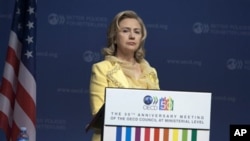The Organization for Economic Co-operation and Development, or OECD, is an organization of 34 countries with activities involving countries across the globe that seeks to stimulate economic progress and world trade. It grew out of an agency founded to administer the Marshall Plan for reconstructing Europe after the Second World War, and was re-formed into its present form in 1961.
Today, it is a multilateral forum for comparing policy experiences of member states, seeking answers to common problems, identifying best practices, and coordinating domestic and international policies of its members.
In late May, representatives of member nations met in Paris, France, to observe the Organization's 50th anniversary. "For all of its changes," said Secretary of State Hillary Clinton, who chaired the event, "the OECD remains as it was in those earliest days, a community of shared values, open and effective markets, human rights, freedoms, and the rule of law, accountable governments and leaders, free, fair and transparent competition.
"For five decades, this has been a laboratory and a launching pad for smart economic policies to bring those values to life. Member states have improved labor conditions, exposed tax havens, worked in ways large and small to hold ourselves and others to even higher standards."
So, at a time when many countries are working to stimulate their sagging economies, the OECD must continue to deliver policies that help unlock the potential for inclusive, sustainable economic growth.
"We need to be serious about eliminating barriers to trade, investment, and fair competition both at our borders and behind them," said Secretary Clinton. "We must do more to support women and girls who want to learn, work, and start their own businesses. . . . And we need to make [development aid] a priority to help nations mobilize their own resources."
But these same nations need to fight corruption, and keep their budgets and revenues transparent. They must collect taxes in an equitable manner, and initiate regulations designed to attract and protect investment.
"The great lessons that we have learned from 50 years of incremental progress is that we can raise the standards of fair competition," said Secretary Clinton. "And when we raise those standards, we help maintain them everywhere."
OECD 50 and Counting

Organization of 34 countries with activities involving countries across the globe seeks to stimulate economic progress and world trade.



